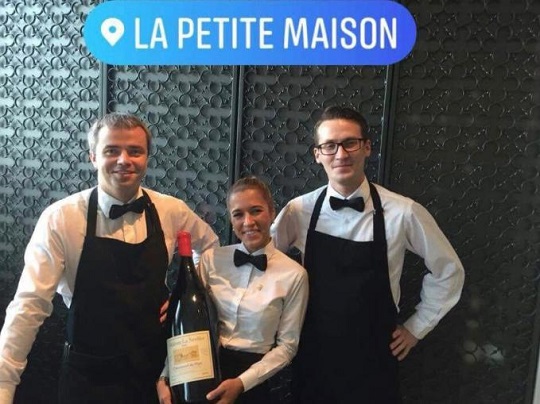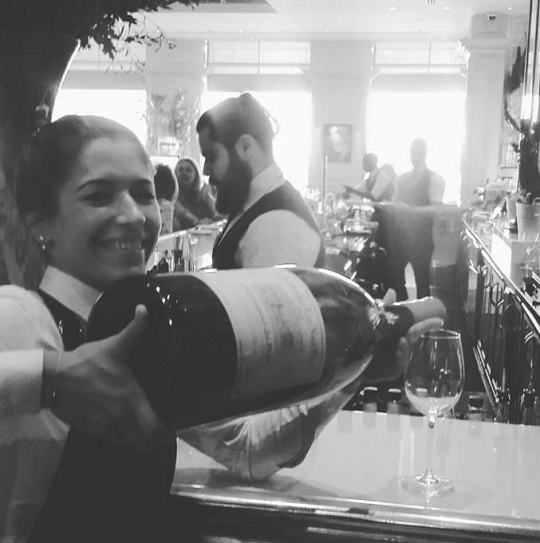Super Early Bird Ends
30 April 2025
Warehouse Deadline
30 Sep 2025
Judging Dates
7 October 2025
Winners Announcement
28 October 2025

Anastasia Zamareva is a sommelier who has been working in restaurants since she was 17, at various positions. She found true joy when she discovered the world of wines, and has been unstoppable ever since.
I started my career in LPM Dubai and I was incredibly lucky to start my journey at this iconic place. I grew and learned a lot over the 3 years I stayed there and that knowledge is still serving me. After UAE I’ve decided to challenge myself in a new place and new language so I moved to the best country for a young sommelier-France. I worked in Monaco, Paris, Cannes, Antibes.. I love discovering new places, meeting new people, adapting myself with different style restaurants - that is the beauty of my job.

As a sommelier I’m trying to find the hidden gem, place it in my wine list and sell it with a story around and with a good fair price. This is ten out of ten! Unfortunately it’s not always the case because you have to respect the wine list and restaurant style, analyze customer needs and meet the objectives from the owners. Sometimes you have to make compromises and leave a wine on the list that you don't really like because customers love it and you don't want to be preconceived.
Our job can be very stressful and sometimes I don’t even have time to eat so when it comes to the supplier meetings I prefer an exchange by emails and sending the portfolio in pdf format over the paper one so I can look at it when I have some free time. I appreciate delicacy and tact and I’m trying to be the same with my suppliers. I’m proud to say that very often my business contacts develop into friendships.
I respect the WSET organisation and many of my colleagues went through this school. I know how hard some levels could be and how long you need to study for them. Having a certification certainly gives you some confidence and recognition.
However, I choose different education path for myself. I like to visit vineyards, talk to winemakers, observe the processes firsthand, taste the wines from the barrels, eat the grapes from the vines. Whenever I’m traveling with my friends or family I’m trying to visit a vineyard and learn on the spot. This knowledge is more “truthful” for me and I can pass it on to the guest with adding some interesting or funny story that I learned during my visit.
With passion of course! If the person in front of you is new to the wine world but willing to learn and to discover, this is a perfect opportunity to hand over your love and excitement. I would choose simple and understandable definitions, do not go to much into technical details but concentrate on emotions that this wine is bringing.

Honestly I don’t really follow the rules.I can find a white wine which will go well with a steak and some red wine which will make your fish dish shine with new flavors. Just follow your instincts and don’t be afraid of experiments.
When I used to work in UAE the customers were often asking for my help. They were really open for suggestions and with my colleagues we were building really strong and trustful relationship with consumers. In France a lot of people already knows about wine so they are rarely asking for an advice of sommelier but prefer to use online platforms such as Vivino to double check their choice.
I think that old generation is more conservative and they are affected by the big names and well known appellations. The young people are more curious and open minded. They can be guided by the new varieties, methods, labels and less known regions. Organic, biodynamic, petnat, raw, orange wine - these terms are in their vocabulary . My job as a sommelier is to “read” the customer and gently propose the wine which will meet all requirements.
I believe that it’s a big work between chef and sommelier. Wine shouldn’t surpass the dish but also should not be lost in food flavors. I’m often tasting the sauces and smelling spices at the kitchen in order to understand the chef’s style.
As a Head Sommelier I’m also thinking about cost-effective positions in my list and wine should be easily accessible for the order.

It’s an important and very personal question for me right now since I’m in a middle of my professional crisis. I feel like I learned a lot about restaurant work after 15 years of experience and now I would like to try myself in something new but still wine related. I have many ideas: brand ambassador, private events, wine tourism, distribution.. I’m giving myself some time to choose what I will genuinely enjoy.
Interviewed by Stuti Khetan, Beverage Trade Network